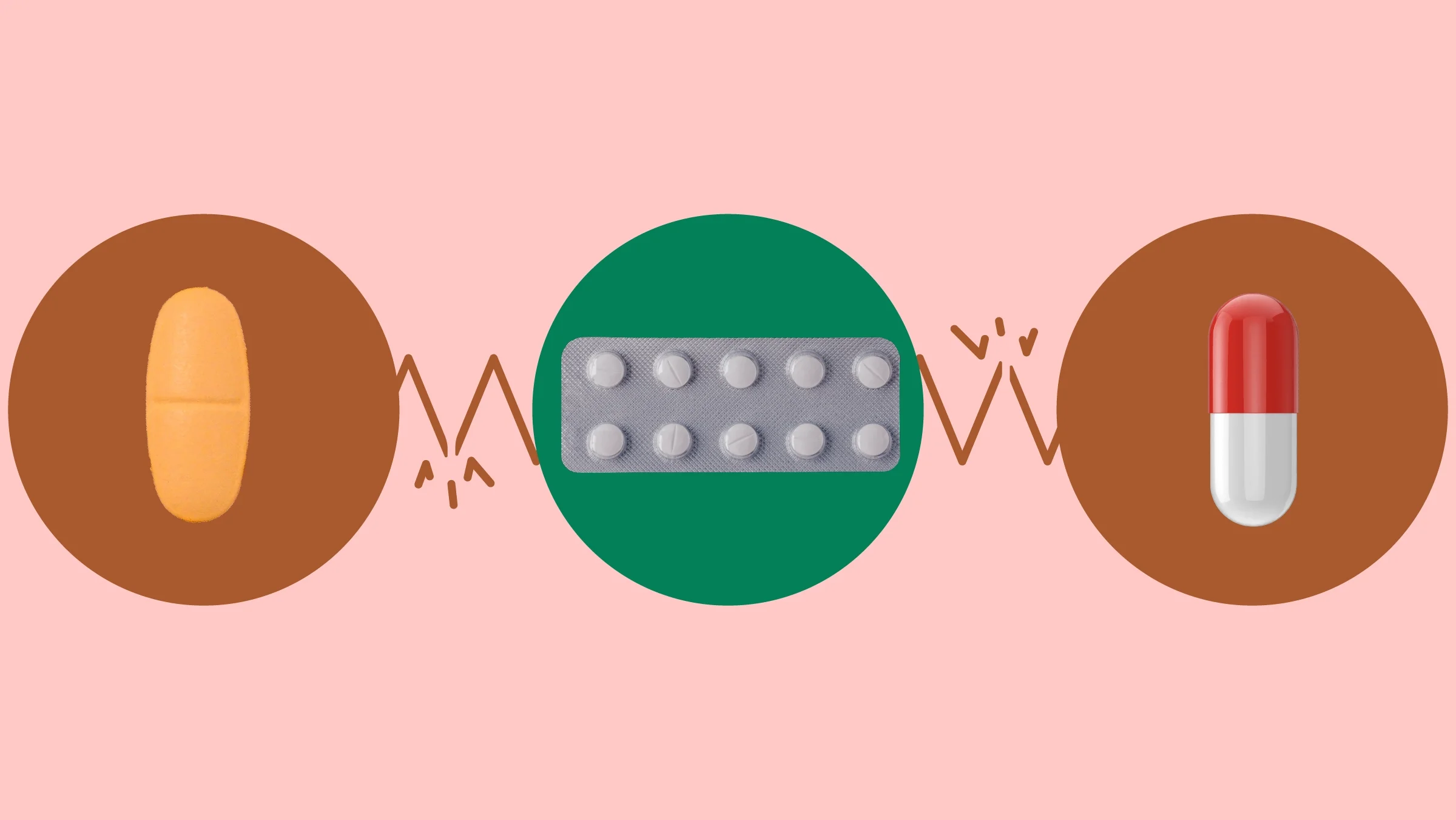Key takeaways:
Bisoprolol is a beta blocker that treats high blood pressure and other heart-related conditions. Taking it with certain heart medications can raise the risk of severely low blood pressure or heart rate. Examples include diltiazem (Cardizem), digoxin, and disopyramide (Norpace).
Other bisoprolol interactions include nonsteroidal anti-inflammatory drugs (NSAIDs), alcohol, and insulin or other diabetes medications. Taking bisoprolol with these medications can raise the risk of side effects.
Certain dietary supplements may interfere with how well bisoprolol works. These include ginseng, licorice root, and St. John’s wort. Talk to your healthcare team before taking any supplements with bisoprolol.
It’s fine to occasionally eat bananas, drink caffeine, and take Tylenol while taking bisoprolol. But large amounts of these items aren’t recommended. They may contribute to heart-related problems.
Save on related medications
Bisoprolol is a beta blocker that’s used to treat high blood pressure (hypertension) and other heart-related conditions. It works by slowing down your heart rate and reducing how hard your heart pumps.
Because of how it affects the heart and blood pressure, bisoprolol can interact with other medications.
Bisoprolol interaction overview
Below is a list of bisoprolol interactions to be aware of when taking it. Other interactions are possible. So always check in with your healthcare team before starting any new medications or supplements while taking bisoprolol.
Bisoprolol interactions list
Other beta blockers
Some calcium channel blockers
Reserpine
Guanethidine
Digoxin
Disopyramide (Norpace)
Flecainide
Amiodarone (Pacerone)
Nonsteroidal anti-inflammatory drugs (NSAIDs)
Certain dietary supplements
Let’s take a look at six common bisoprolol interactions in more detail.
Other blood pressure medications
Since bisoprolol lowers your blood pressure and heart rate, it can interact with other medications that have similar effects.
It’s best to avoid taking bisoprolol with other beta blockers or certain calcium channel blockers (another type of blood pressure medication). This includes diltiazem (Cardizem) and verapamil (Calan SR).
Combining bisoprolol with these medications could slow your heart rate or lower your blood pressure to a dangerous level.
Other common blood pressure medications, such as diuretics and angiotensin-converting enzyme (ACE) inhibitors, also carry this risk. But in most cases, you can take them with bisoprolol without any problems. Your prescriber may just have you check your blood pressure at home to keep an eye out for any issues.
Good to know: Amlodipine (Norvasc) is a calcium channel blocker that’s less risky to take with bisoprolol. In fact, the combination may have added benefits for some people. Your prescriber will determine the best treatment options for you based on your medical history.
1. Other medications that control your heart rate
Bisoprolol can also interact with other medications that control your heart rate. These medications are typically prescribed for irregular heartbeats (arrhythmias) and heart failure. Examples include:
Disopyramide (Norpace)
Amiodarone (Pacerone)
Flecainide
Starting a beta blocker? Here are some tips to help you get the most from your medication.
Bisoprolol side effects: Learn about common and rare bisoprolol side effects, how to manage them, and when to seek medical care.
Beta blockers and weight gain: Here’s what to know about weight gain while taking beta blockers and steps you can take to help prevent it.
Like bisoprolol, these medications can slow your heart rate. Because of their overlapping effects, combining them can drop your heart rate too much. If you need to take both of these medications, your healthcare team may monitor your heart rate to make sure it’s not dipping too low. If you start feeling weak, become lightheaded, or have blurry vision while taking bisoprolol with one of these medications, seek emergency care.
2. NSAIDs
NSAIDs are common over-the-counter (OTC) and prescription pain relievers. Examples include ibuprofen (Advil, Motrin) and naproxen (Aleve, Naprosyn).
NSAIDs don’t interact directly with bisoprolol. But it’s best to avoid NSAIDs if you have a history of high blood pressure or other heart-related conditions. That’s because they may raise your risk of heart attacks, especially if you already have heart problems.
Your healthcare team can let you know if taking an occasional NSAID is safe for you while taking bisoprolol. They can also recommend safer options for your pain or fever if needed.
Good to know: Low-dose aspirin is an NSAID. But it’s often recommended for people with certain heart conditions. That’s because it doesn’t carry the same risks as other NSAIDs when it comes to heart health. So it’s considered safe to take with bisoprolol if your healthcare team recommends it.
3. Alcohol
It’s best to avoid or limit alcohol while you’re taking bisoprolol. Alcohol can worsen bisoprolol’s side effects, such as dizziness and lightheadedness. It may also make bisoprolol less effective at lowering your blood pressure.
What’s more, regular alcohol use can contribute to weight gain and high blood pressure. And both of these effects could worsen your existing heart condition. Talk with your prescriber about whether any amount of alcohol is safe for you while taking bisoprolol based on your medical history.
4. Insulin and other diabetes medications
Insulin and other diabetes medications help manage blood glucose (sugar) levels. In some cases, your blood glucose level may drop too low (hypoglycemia) when you’re taking these medications. Normally, the symptoms of low blood glucose (such as shaking, confusion, or a fast heartbeat) alert you that it’s happening. You can then take steps to correct it, such as using a glucose gel or tablets.
But bisoprolol can make it harder to recognize when your blood sugar is too low. That’s because beta blockers can mask some of these warning signs. So you may need to check your blood glucose levels more often while you’re taking bisoprolol. Keep in mind that sweating is a side effect of low blood sugar that isn’t affected by bisoprolol. So if you take insulin or other diabetes medications and start sweating unexpectedly, it’s a good idea to check your glucose level.
5. Some dietary supplements
Certain dietary supplements can affect your blood pressure and heart rate. They may not directly interact with bisoprolol. But it’s best to avoid them while you’re taking it. They may interfere with how well it works.
Supplements to avoid while taking bisoprolol include:
Ephedra (ma huang)
Bitter orange
Asian ginseng
Guarana
Licorice root
Yohimbe
St. John’s wort
Frequently asked questions
It’s a good idea to limit caffeine while taking bisoprolol or other blood pressure medications. A few cups of coffee per day is unlikely to cause an issue. But large amounts of caffeine can raise your blood pressure and heart rate. This can make bisoprolol less effective.
Check with your healthcare team about how much caffeine is safe for you based on your medical history.
Yes, you can eat bananas while you’re taking bisoprolol. Bananas are known for being a good source of potassium. Other blood pressure medications (including some beta blockers) may require you to watch your potassium intake. But bisoprolol isn’t usually one of them.
Just be sure to check with your pharmacist or prescriber to make sure potassium isn’t a problem with any of your other medications or health conditions.
Acetaminophen (Tylenol) doesn’t interact directly with bisoprolol. But there is some evidence that taking large amounts or regularly taking Tylenol may increase your blood pressure.
Tylenol is still considered a safer choice than NSAIDs for pain or fever relief if you’re taking blood pressure medication. But it’s best to check with your healthcare team before taking Tylenol frequently or in large amounts.
It’s a good idea to limit caffeine while taking bisoprolol or other blood pressure medications. A few cups of coffee per day is unlikely to cause an issue. But large amounts of caffeine can raise your blood pressure and heart rate. This can make bisoprolol less effective.
Check with your healthcare team about how much caffeine is safe for you based on your medical history.
Yes, you can eat bananas while you’re taking bisoprolol. Bananas are known for being a good source of potassium. Other blood pressure medications (including some beta blockers) may require you to watch your potassium intake. But bisoprolol isn’t usually one of them.
Just be sure to check with your pharmacist or prescriber to make sure potassium isn’t a problem with any of your other medications or health conditions.
Acetaminophen (Tylenol) doesn’t interact directly with bisoprolol. But there is some evidence that taking large amounts or regularly taking Tylenol may increase your blood pressure.
Tylenol is still considered a safer choice than NSAIDs for pain or fever relief if you’re taking blood pressure medication. But it’s best to check with your healthcare team before taking Tylenol frequently or in large amounts.
The bottom line
Bisoprolol is a beta blocker that treats high blood pressure and other heart-related conditions. Taking it with other heart medications can raise your risk of severely low blood pressure or heart rate. It’s best to avoid taking bisoprolol with certain calcium channel blockers as well as heart rhythm medications such as digoxin and amiodarone (Pacerone).
NSAIDs, alcohol, and certain supplements can worsen bisoprolol side effects or make it less effective. It’s best to avoid taking these medications with bisoprolol. Bananas, Tylenol, and caffeine don’t interact with bisoprolol. But consuming large amounts of these items may contribute to heart problems. So it’s best to avoid them in large amounts.
Bisoprolol can mask the symptoms of low blood glucose. You may need to check your blood glucose levels more often if you’re taking it along with insulin or other diabetes medications.

Why trust our experts?



References
Bazroon, A. A., et al. (2023). Bisoprolol. StatPearls.
Hostalek-Gottwald, U., et al. (2022). A growing evidence base for the fixed-dose combination of bisoprolol and amlodipine to manage hypertension. Current Medical Research and Opinion.
NorthStar Rx LLC. (2024). Bisoprolol fumarate - bisoprolol fumarate tablet, film coated [package insert].
Sun Pharmaceutical Industries Limited. (2024). Bisoprolol fumarate- bisoprolol fumarate tablet, film coated [package insert].
Vue, M. H., et al. (2011). Drug-induced glucose alterations part 1: Drug-induced hypoglycemia. Diabetes Spectrum.

















